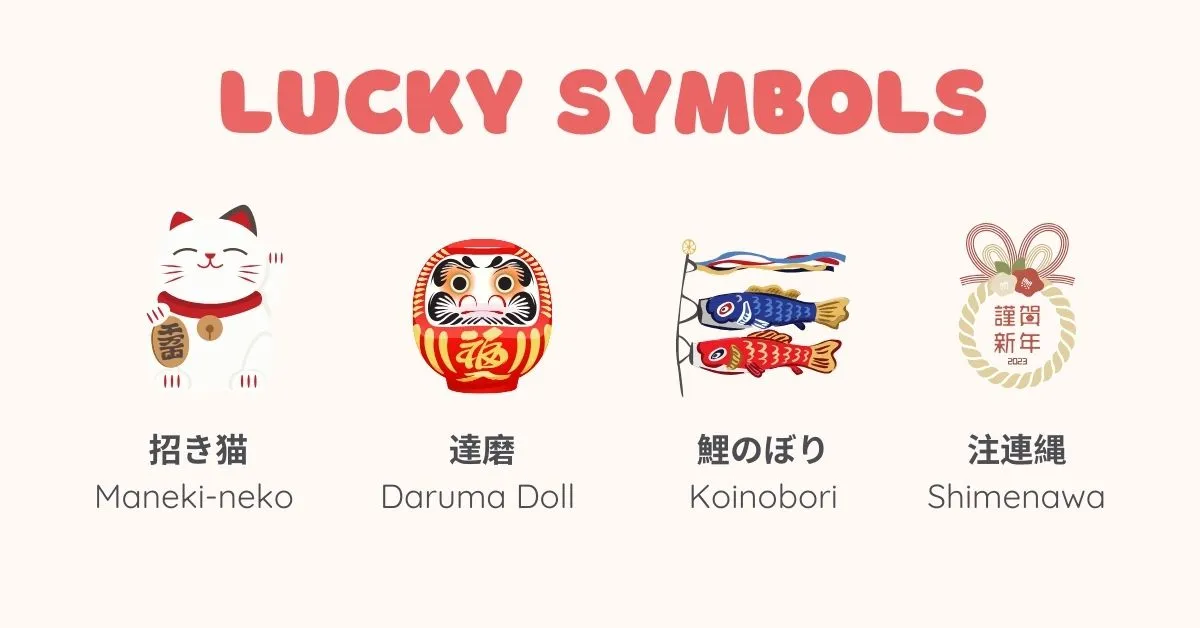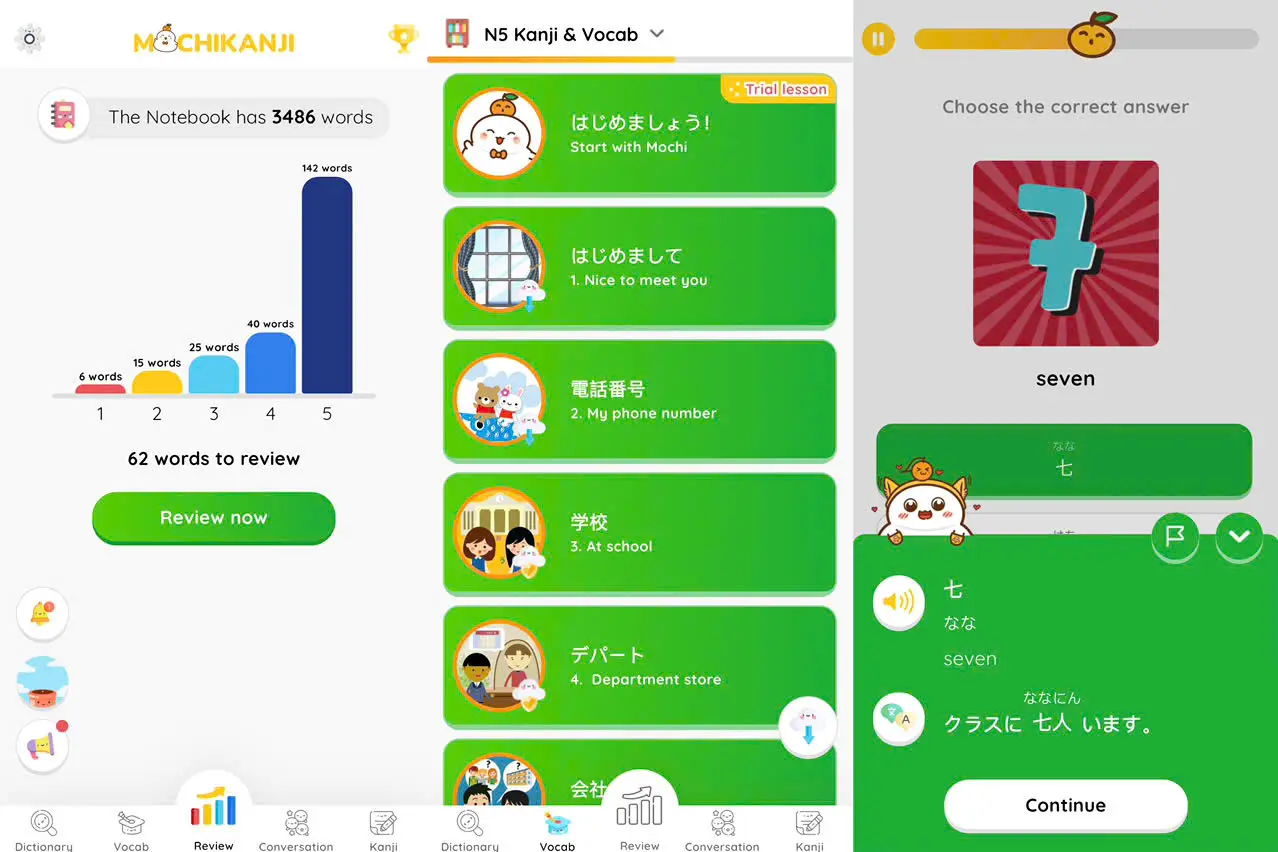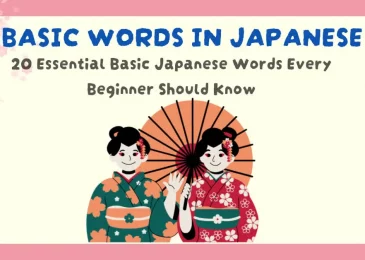Japan has a rich cultural tapestry of language, beliefs, and traditions centered around the concept of luck. Japanese people honor various expressions, symbols, and customs that signify good fortune, making the idea of luck integral to daily life and personal relationships. This guide delves into the different ways to say “lucky” in Japanese, explores lucky symbols, and highlights customs and expressions that reflect Japanese ideas about luck.
1. Words for “Lucky” and “Good Fortune” in Japanese
In Japanese, the concept of “luck” or “good fortune” is often translated as 幸運 (kouun). This word combines two kanji: 幸 (kou, meaning “happiness”) and 運 (un, meaning “fortune” or “fate”). Together, these characters create a term that encapsulates the idea of favorable outcomes, happiness, and luck.
Related Expressions for “Lucky” in Japanese:
- 運がいい (un ga ii): A common expression meaning “lucky” or “to have good fortune.” For example, someone who often wins games or avoids mishaps may be described this way.
- ついている (tsuite iru): Literally meaning “to be attached” or “to be accompanied by,” this phrase is used to express a feeling of being “in luck.”
- 幸せ (shiawase): Although it translates as “happiness,” this word can imply a state of contentment that often comes from good fortune.
2. The Influence of Luck in Japanese Culture
The Japanese hold strong cultural beliefs regarding luck, particularly around events like New Year celebrations, temple visits, and even daily rituals. Luck in Japan isn’t just about random chance; it’s viewed as something people can cultivate or protect through specific behaviors, items, and practices.
3. Lucky Symbols and Their Meanings

Certain items and symbols represent luck in Japan. These symbols hold cultural and spiritual significance, making them popular in both homes and public spaces. Here are a few well-known lucky symbols:
- Maneki-neko (招き猫): The beckoning cat statue, which is believed to attract luck, wealth, and prosperity. It’s often displayed at store entrances to invite customers. Depending on which paw is raised, the statue may symbolize a call for financial luck (left paw) or protection and good fortune for family and loved ones (right paw).
- Daruma Doll (達磨): Modeled after Bodhidharma, the founder of Zen Buddhism, this doll symbolizes perseverance and good fortune. It’s tradition to color in one eye when setting a goal and the other only once the goal is achieved, making the daruma an emblem of hope, ambition, and good fortune.
- Koinobori (鯉のぼり): Carp streamers flown during Children’s Day to symbolize strength, courage, and good luck. The carp represents resilience, stemming from a legend in which a carp swims upstream to become a dragon. These colorful streamers are thought to bring children good fortune and determination.
- Shimenawa (注連縄): Sacred ropes decorated with paper strips, these are often hung around trees, rocks, or entryways to mark sacred spaces and repel misfortune. These ropes signify purification, a concept deeply connected with ensuring good fortune by avoiding negative influences.
4. Japanese Expressions for Wishing Good Luck
Several Japanese phrases express the wish for good fortune, often used during important life events or before challenges. Some common expressions include:
- 頑張って! (Ganbatte!): Often translated as “Do your best!” or “Good luck!” It’s a motivational phrase encouraging someone to put in effort and persevere, reflecting the Japanese belief that hard work and determination lead to good fortune.
- 幸運を祈ります (Kouun o inorimasu): This formal phrase means “I pray for your good fortune.” It’s often used in written or formal contexts, such as in a letter or when speaking to someone before an important life event, like a job interview.
- ご武運を祈ります (Gobuun o inorimasu): Originally a samurai expression, this phrase is a formal way to wish someone good fortune, particularly in battle or challenges requiring courage.
5. Numbers and Superstitions: Japanese Beliefs About Lucky and Unlucky Numbers
In Japan, certain numbers are seen as either lucky or unlucky, often based on their pronunciation and historical associations. Here’s a closer look:
- Lucky Numbers:
- 7 (shichi, nana): Considered lucky in many cultures, seven is particularly auspicious in Japan. There are seven deities of good fortune, and the number often appears in Buddhist practices and ceremonies, adding to its positive reputation.
- 8 (hachi): With its kanji 八 widening at the bottom, 8 symbolizes growth, abundance, and stability.
- Unlucky Numbers:
- 4 (shi): This number is often avoided, as “shi” is also a reading for the kanji “死,” meaning “death.”
- 9 (ku): Also avoided due to its similarity in sound to “苦” (suffering or hardship).
6. Traditional Japanese Lucky Charms
Japanese culture includes a wide variety of charms and talismans believed to bring good luck, protection, or health. These items are often purchased at temples, shrines, or festivals and kept close or given as gifts.
- Omamori (お守り): Small, colorful cloth pouches containing prayers or blessings. Omamori can be bought at shrines and are tailored to specific needs, like health, love, success, or safety. People carry omamori in bags, wallets, or cars as a form of protection.
- Ema (絵馬): Wooden plaques where visitors to shrines write their wishes and prayers. People leave these plaques at shrines, hoping that their desires will be granted. These are especially popular during New Year, exam season, and before important life events.
- Hamaya (破魔矢): Known as “demon-breaking arrows,” these items are sold at shrines during New Year to bring good fortune and ward off evil spirits. The hamaya is traditionally displayed in the home to protect the family.
7. Festivals and Rituals Associated with Good Fortune
Japan’s seasonal festivals and rituals are often centered on themes of luck and prosperity. Here are a few notable examples:
- New Year (お正月): Japanese New Year is filled with traditions meant to bring good fortune for the coming year. People visit temples, participate in bell-ringing ceremonies, and purchase new omamori or daruma dolls.
- Setsubun (節分): Celebrated in early February, this festival marks the beginning of spring. People throw roasted soybeans to drive away evil spirits and invite good fortune into their homes. They chant, “鬼は外! 福は内!” (Oni wa soto! Fuku wa uchi!), meaning “Demons out! Fortune in!”
- Tanabata (七夕): Celebrated on July 7th, Tanabata is a festival in which people write wishes on colorful strips of paper and hang them on bamboo branches. The festival is inspired by a myth of star-crossed lovers and is associated with good fortune and love.
8. Using “Lucky” in Japanese Daily Life
Luck in Japanese culture isn’t only celebrated during major festivals. Many people incorporate lucky practices and beliefs into their daily routines:
- Belief in Auspicious Days: The Japanese calendar includes special days called “rokuyou,” which are believed to have varying degrees of luck. Taian (大安) days are the luckiest and are often chosen for weddings and business openings.
- Lucky Meals: Certain foods are believed to bring good luck, especially during special occasions. For instance, eating soba noodles on New Year’s Eve symbolizes a wish for a long life.
How to Learn and Remember the Japanese Vocabulary for “Lucky”
You can learn Japanese vocabulary on the theme of lucky faster, and keep it in your long term memory by doing this.
Use flashcards
- Use flashcard apps like Anki or Quizlet: Apps that allow you to easily create and review vocabulary.
- Illustrations: Provide images associated with vocabulary to improve memorization.
It helps to anchor a word within an anecdote, or story:
- Write Hear little Stories: Write something meaningful or funny using the vocabulary.
- Thes use in real life: e.g. “luck” (幸運 – Kouun) associated with a time you had good luck, etc.
Learning Through Music and Movies
- Easier than practicing, just enjoy Japanese Music or Movies (With luck themed songs or movies to help with vocabulary).
- Useful Lyrics and Dialogues: Listen to lines with sentences that contain vocabulary about luck
Use language learning apps
- MochiKanji: MochiKanji is a Kanji and Vocabulary Learning App. The details of kanji make them hard. This is made infinitely easier with MochiKanji thanks to the interactive exercises and the spaced repetition system (SRS) that we use for vocabulary practice.

The SRS on MochiKanji helps you review vocabulary at specific intervals, optimizing long-term memory retention. MochiKanji automatically schedules the vocabulary you need to review based on your memory strength, enhancing learning efficiency. By using MochiKanji, you ensure that the words you learn are reviewed just as you are about to forget them, solidifying them in your long-term memory.
Conclusion: Embracing Luck in Japanese Language and Culture
The concept of luck in Japan is more than just a feeling; it’s an integral part of daily life, traditions, and social interactions. From linguistic expressions like “幸運” (kouun) and “頑張って” (ganbatte) to charms, numbers, and rituals, luck in Japan reflects a blend of spirituality, superstition, and cultural respect. Whether through a daruma doll on a desk or a simple wish on an ema at a shrine, the Japanese approach to luck is thoughtful and ingrained in customs, making it a fascinating aspect of Japanese language and culture.





